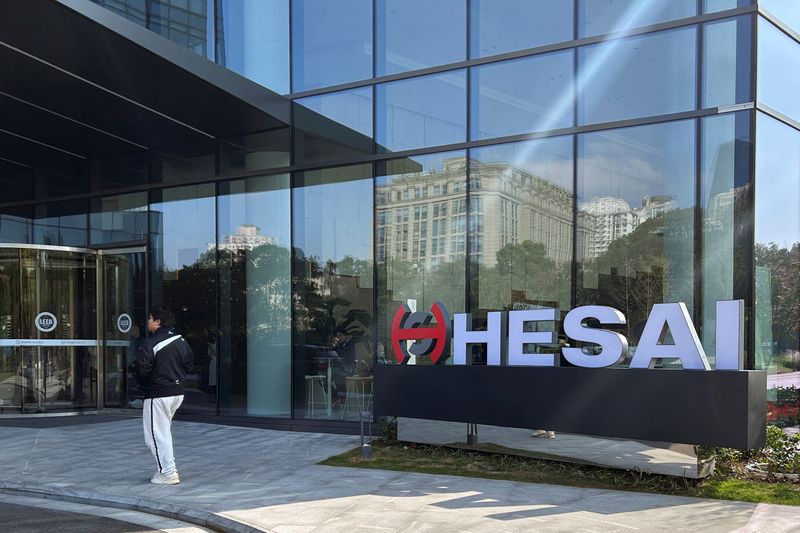SHANGHAI (Reuters) - China's Hesai Group, the world's largest maker of lidar sensors for autonomous driving, said it plans to slash the price of its key product by half next year which should lead to far wider adoption of the technology in electric cars.
"We are moving to a stage where millions of cars sold annually are equipped with lidar," Chief Executive David Li told Reuters in an interview.
Halving the price would make the use of lidar appealing even for cheaper EVs priced below 150,000 yuan ($20,000), he added.
For electric cars priced above that, the adoption rate for lidar technology would likely jump to 40%, Li also said. That compares with a current rate of about 24% for Chinese EVs and plug-in hybrids, according to auto parts trading platform Gasgoo.com.
Lidar uses lasers to produce three-dimensional images of a vehicle's surroundings which helps vehicles navigate around obstacles. The sensors are a key component of many self-driving systems being developed by automakers.
"We should see this as the popularization of lidar as a standard safety component for EVs," Li said, likening its use to that of airbags and safety belts.
Hesai's next-generation lidar product ATX for advanced driver assistance systems (ADAS) will be sold next year for under $200, half the price of the current AT128 model.
The price cut will be made possible by using self-developed chips to run lidar sensors and improving factory operation rates, Li added.
His comments come after the company reported earnings on Tuesday when Li said he expected Hesai to break even in the current quarter following a net loss of 70.4 million yuan ($9.7 million) in the third quarter.
Shares in Nasdaq-listed Hesai soared 44% on Tuesday after the results, giving it a market cap of roughly $875 million.
Encouraged by strong demand from automakers in China, the 10-year-old company plans to more than double output at its plant in Hangzhou next year to its full annual capacity of 1.5 million units.
It currently supplies a dozen automakers in China including Li Auto (NASDAQ:LI) and BYD (SZ:002594). Its lidar sales more than tripled in the third quarter to nearly 130,000 units.
Hesai Chief Financial Officer Andrew Fan said in the same interview that the company is looking to expand globally and has been in discussions with foreign automakers.
Asked how Hesai might counter potential entry barriers to foreign markets such as the U.S. and Europe due to growing trade tensions, Li said Hesai was "actively exploring" avenues to set up plants overseas.
"In the long run, the global trend would be for countries like the United States to encourage us to set up local plants and create jobs locally," said Li.

Lidar technology has notably been shunned by Tesla (NASDAQ:TSLA), which instead relies on cameras and artificial intelligence to detect hazards around its vehicles.
($1 = 7.2506 Chinese yuan)